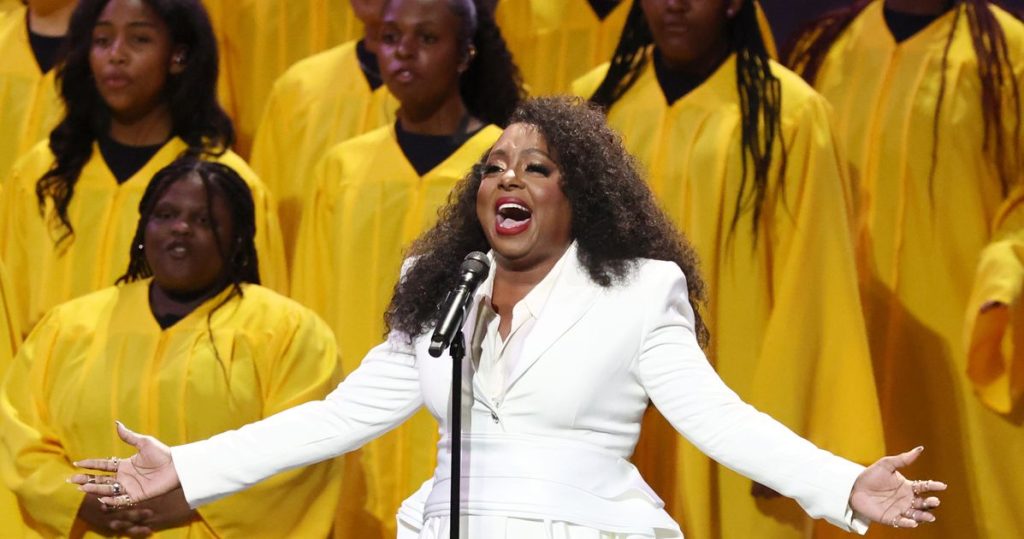The Power of "Lift Every Voice and Sing" at Super Bowl LIX
Grammy Award-winning singer Ledisi, a native of New Orleans, delivered a stirring rendition of “Lift Every Voice and Sing” during the pregame ceremony at Super Bowl LIX in her hometown. The song, widely regarded as the Black national anthem, was performed alongside a choir of 125 high school students from the Greater New Orleans High School Chorale Collective. While the performance was a moment of cultural pride and unity for many, it sparked outrage among some right-wing conservatives, who labeled the song divisive and accused it of promoting segregation. This backlash, however, fundamentally misunderstands the historical and cultural significance of the song, which is rooted in the Black American experience and serves as a powerful expression of resilience, hope, and unity.
The Historical and Cultural Significance of "Lift Every Voice and Sing"
“Lift Every Voice and Sing” was written by James Weldon Johnson in 1900 as a poem to celebrate Abraham Lincoln’s birthday. Johnson, a principal and lawyer who was the first Black American to pass the Florida bar, later set the poem to music composed by his brother, John Rosamond Johnson. The song gained prominence during the civil rights movement of the 1950s and 1960s, becoming a rallying cry for Black Americans fighting for equality and justice. In 1919, the NAACP officially adopted it as the Black national anthem, a title it has held ever since. The song’s lyrics reflect both the pain of the past and the hope for a brighter future, making it a profound expression of Black resilience and aspiration. Despite its rich history, “Lift Every Voice and Sing” has been met with criticism in recent years, particularly from conservatives who view its inclusion in public events as exclusionary. However, as historian Burton W. Peretti notes, the song’s message of hope and perseverance remains central to the African American experience today.
Right-Wing Backlash and the Misguided Notion of Division
The performance of “Lift Every Voice and Sing” at Super Bowl LIX was not the first time the song has sparked controversy. In 2021, the NFL began featuring the song at Super Bowl pregame ceremonies, a decision that drew criticism from figures like former Fox News personality Megyn Kelly. Kelly argued that the song’s inclusion was divisive, writing on social media, “The so-called Black National Anthem does not belong at the Super Bowl. We already have a National Anthem and it includes EVERYONE.” Similar complaints surfaced this year, with some conservatives accusing the song of promoting segregation. However, these arguments fail to understand the song’s purpose. As Gerald Early, a professor of African and African-American Studies, explained, “Lift Every Voice and Sing” should be framed not as a protest song but as a song of Black affirmation, perseverance, and inspiration. It is not about dividing Americans but about acknowledging the unique struggles and triumphs of Black people in the United States.
The Broader Cultural War on Black Celebrations
The backlash against “Lift Every Voice and Sing” is part of a larger cultural war on Black celebrations and traditions, which has intensified since Donald Trump took office. This year’s Super Bowl was no exception. In addition to the Black national anthem, right-wing critics took issue with Kendrick Lamar’s halftime show, which celebrated Black culture and featured prominent Black figures such as singer SZA, tennis legend Serena Williams, and actor Samuel L. Jackson. Some labeled the show a “DEI halftime show,” a term many interpreted as a veiled critique of diversity and inclusivity. These attacks reflect a broader effort to dismiss and erase Black cultural expressions, which has been exacerbated by the Trump administration’s recent actions. In January, the Defense Department announced that it would no longer observe cultural awareness months, including Black History Month, following Trump’s executive actions targeting diversity, equity, and inclusion practices. This decision was justified with the claim that such efforts “divide the force” and undermine unity. However, as Erica Foldy, a professor at New York University, argued, celebrating Black history is not divisive—it is essential. “For centuries, Black history was erased,” she said. “Black History Month raised the visibility of Black history—not just about slavery and Jim Crow but also about the essential role of Black people in creating the U.S. we know today.”
The Enduring Legacy of "Lift Every Voice and Sing"
Despite the controversy, “Lift Every Voice and Sing” remains a powerful symbol of Black resilience and hope. Its history is a testament to the enduring spirit of African Americans in the face of systemic oppression. The song was first performed publicly in 1900 by a group of schoolchildren in Jacksonville, Florida, and it quickly became a beloved hymn in Black communities across the country. Over the years, it has been performed by iconic figures such as Aretha Franklin and Beyoncé, who included it in her groundbreaking 2018 Coachella performance. For many, the song is more than just a piece of music—it is a source of pride, comfort, and inspiration. As Beyoncé wrote in an essay for Vogue that year, performing “Lift Every Voice and Sing” was “one of the most rewarding parts of the show.” She noted that while many young people in the audience may not have known the song’s history, they understood the feeling it gave them. This emotional connection is at the heart of the song’s enduring legacy.
A Call for Unity and Understanding
In the face of ongoing criticism, it is important to remember that “Lift Every Voice and Sing” is not a song of division but one of unity. It acknowledges the painful history of racism and oppression in America while also expressing a hopeful vision of a future where all people can thrive. As Shana Redmond, a professor at UCLA, explained, the song serves as a counterpoint to the exclusionary history of the U.S. national anthem, “The Star-Spangled Banner,” which was written in 1814 and contains lyrics that have been criticized as racist and anti-Black. “Lift Every Voice and Sing” fills this gap by offering a radical vision of equality and inclusion. Its performance at the Super Bowl—and in other public spaces—should be seen not as a source of conflict but as a celebration of American culture in all its rich diversity. As Ledisi, the singer who performed the song at Super Bowl LIX, said, “Whether some believe it or not, it’s part of our history.” She added, “I’m honored to help remind us all why music is a beautiful language for us to come together.” In a time of increasing polarization, “Lift Every Voice and Sing” remains a powerful reminder of the shared humanity that binds us all.















